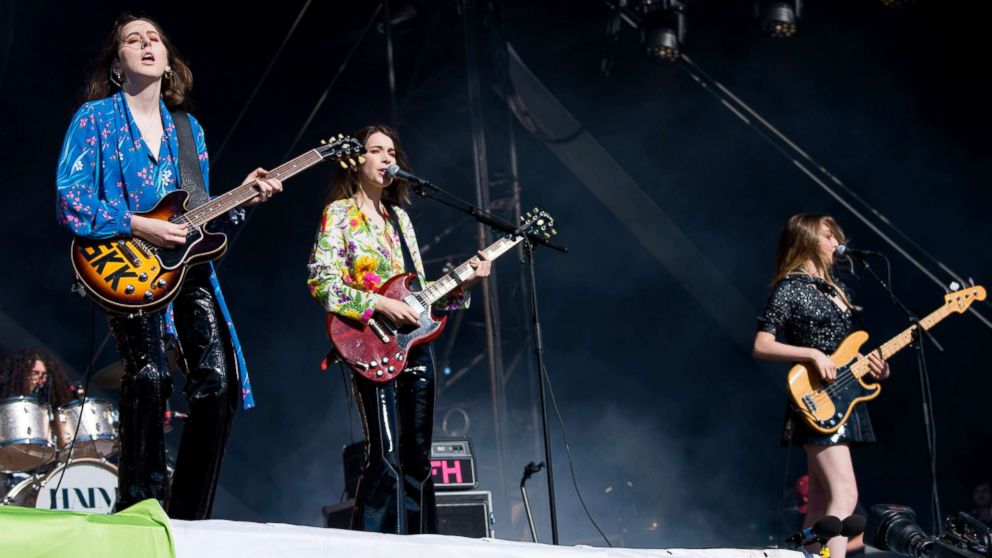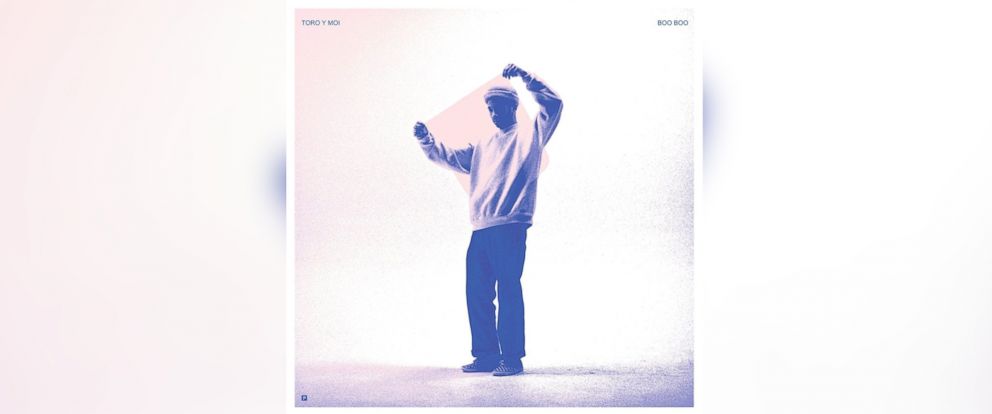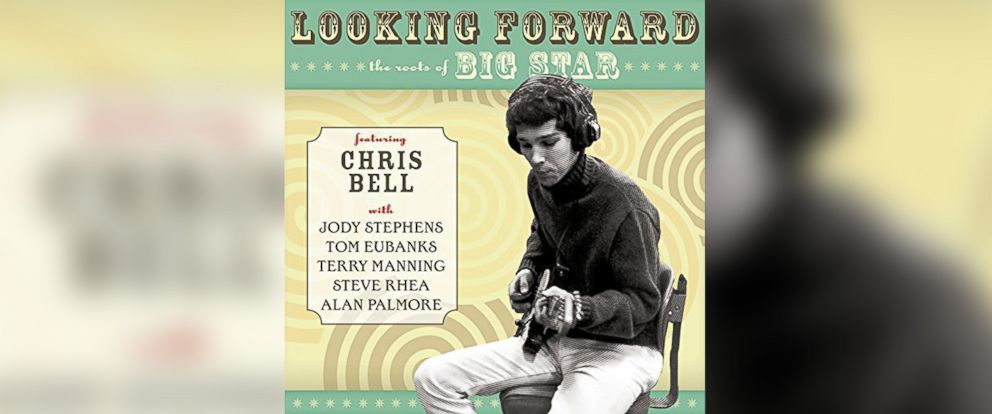Album reviews: Haim, Broken Social Scene, Toro y Moi, and Chris Bell
Plus, get the latest from Broken Social Scene, Toro y Moi and Chris Bell.

— -- This week the Haim sisters release their second full-length, Canadian collective Broken Social Scene return, electro-tinged indie act Toro y Moi drops a new album and a compilation showcases the pre-Big Star bands of the late Chris Bell.
Haim’s “Something to Tell You”
**1/2
The Haim sisters return and follow up their quite enjoyable first record, “Days Are Gone” with “Something to Tell You.” Unfortunately, this record is a pale, streamlined shadow of its predecessor and a textbook example of a “sophomore slump.” Whereas “Days Are Gone” was a bright, uplifting, bouncy record, “Something to Tell You” finds Haim stuck in the world of bland balladry. This is a very monochromatic offering which maintains a hint of the band’s essence but often becomes repetitive and in many places, uninspired and a bit boring.
Lyrically these songs too often are found to just repeat their titles over and over again. Both “Want You Back” and “Right Now” rank among the best of the bunch but they are still quite guilty of this. The same could be said for “Walking Away.” This is an album heavy of mood but short on ideas.
There’s a relaxed sense to this record, as well. “Ready for You” and “You Never Knew” both aim to be the soundtrack for breezy summer days, but overall within the context of the rest of the album, they drive home the notion that this record is stuck in a “Lite Radio” holding pattern. You will probably find yourself missing the oddball experimentation heard on portions of “Days Are Gone.” Nothing here for instance matches the coolness of say, “My Song 5.” Instead the band is seemingly left running in place.
“Nothing’s Wrong” sounds like it was influenced by the pop side of Shania Twain, while “Little of Your Love” sounds like a standard attempt at a faceless pop single. While the cheesiness of “Days Are Gone” seemed like a winking, lovingly-executed exercise, here they’ve crossed the line into banality.
Some fans of their first record will still probably connect with this one. It has its worthy moments but lacks the fun spark that gave the first album a bit of a jump.
Here’s hoping that the Haim sisters bring back the bit of edge and the sense of sonic variety on album number three. My hope is that “Something to Tell You” is just a momentary stumble. There’s a ghost of a good record here, but as is, this album is woefully half-baked.
Focus Tracks:
“Right Now” My above criticisms stand, but this is one of the best examples of the formula at hand. The rest of the album could use more moments like the brief doses of fuzz-rock heard here. This small dose of edginess goes a long way.
“Night So Long” This closer is short but it deviates a little and has a winning, slowly soaring tone. It feels like it is going to build into something bigger but it stops abruptly at 3:05.
“Want You Back” The syncopated vocal repetition during the chorus can get to be a little much, but it is still easy to see why this song was picked as a single.

Broken Social Scene’s “Hug of Thunder”
***1/2
“Hug of Thunder” is the first Broken Social Scene record since 2010’s “Forgiveness Rock Record,” and like all of its predecessors, it finds leaders Kevin Drew and Brendan Canning joined by a wide variety of guests. Feist sings the title-track for instance and Metric’s Emily Haines handles vocals on “Protest Song.” Too often in the past, with their many, many collaborators, Broken Social Scene albums have come off as almost too busy for their own good. You used to get the feeling that there were just too many cooks in the kitchen. This record is different. It sounds slightly more focused and less dizzying. It is still more ambitious a record than it is accessible, but that comes with the territory and every now and then, its pieces align into something fascinating.
“Please Take Me with You” for instance is striking and warm and the twisting bass-line of “Mouth Guards of the Apocalypse” will draw you further into the song. There’s a dreamy, atmospheric feeling throughout this set which keeps it working at a winning pace even when the songs aren’t particularly catchy. There’s an appealing, semi-nostalgic vibe.
This is also at times a highly experimental set. The crashing guitars that set off “Vanity Pail Kids” immediately hit you, even if the song soon seesaws in and out of utter chaos. This kind of boldness shouldn’t come as a surprise to anyone familiar with the band’s previous efforts.
“Hug of Thunder” isn’t a complete slam-dunk but it is an assured, well-formed collection that showcases many of the best aspects of the art-rock collective. Drew, Canning and their many collaborators have done some pretty solid work here, even if it is still a bit maddening and hard to pin down.
Focus Tracks:
“Please Take Me With You” Easily one of the best songs of the band’s career, this blends a warm bass-line with a winning melody and some very subtle “drum’n’bass” style rhythms. But it has an easily cool sense to its construction as Drew firmly takes the lead.
“Hug of Thunder” Fresh off of her arty, raw, experimental new album, “Pleasure,” Feist makes this subtle rambler come to a head with a few slightly explosive rises. This is an unusual song, for sure, which will mean probably that you’ll have to listen to it a few times before you get a full understanding, but at the 2:36 mark, it fully clicks and makes absolute sense.
“Skyline” Serving almost as a hybrid between Americana and dream-pop, this track offers up an effective anthem.

Toro y Moi’s “Boo Boo”
***1/2
On his fifth album under the moniker Toro y Moi, Chaz Bundick goes further into his signature electro R&B realm. “Boo Boo” is an affecting exercise in relaxed warmth as Bundick smoothly sings over occasionally experimental backdrops. While there’s a definite charm to opener, “Mirage,” “Pavement” is unmistakably woozy in its execution, while “Don’t Try” sounds like a commanding piece of score music.
Bundick is definitely aiming to capture a mood here and while this record has its challenging passages, he succeeds, delivering a set that is somehow simultaneously lush and ominous in its approach. Like Washed Out and Blood Orange, Toro y Moi is just one of many acts capturing a new sense of electro coolness. I’m sure on vinyl this album really blossoms.
Even when Bundick puts an electronic layer over his voice on “Windows,” it doesn’t ruin the vibe. I’ve said it before. I’ll say it again. Electro effects over voices should be used sparingly and merely for decoration and not as crutches. Bundick sometimes knows to use this kind of effect well, although single “Girl Like You” would probably sound better without this kind of treatment. The same could be said for “Inside My Head,” later in the record.
“You and I” and “Labyrinth” both capture an appealing wistfulness and should be licensed for use in artsy indie-films. There’s a home-made, intimate quality to this record but it is obvious that Bundick is an inspired craftsman who makes every measured move intentionally.
“Boo Boo” is a chilled-out pre-or-post-party record that summons a specific, relaxed mood. It has its polarizing moments and it isn’t a perfect record by any means but it still maintains a somewhat singular atmosphere even during its lesser moments.
Focus Tracks:
“Don’t Try” This track’s dark, foreboding undertone really stands out on the set, even if softer, more ornate aspects are also still in earshot within the overall arrangement. Between the pounding beat and Bundick’s nearly deadpan verse-delivery, this song really makes a lasting impression.
“Mirage” It has some left-field turns but this opener’s slick delivery sets the set off on the right foot.
“No Show” Set adrift in a sea of reverb, this song sounds sunny and distant at the same time. It is both woozy and melodic.

Chris Bell’s “Looking Forward: The Roots of Big Star”
****
Whomever is in charge of the legacy of Big Star is doing a bang-up job, considering the recent release of “The Best of Big Star” and this collection, which centers around Chris Bell, the band’s co-founder, who left the band after their 1972 debut, “#1 Record” failed to make the impact it deserved, mostly due to shockingly poor distribution. Bell would die in a car accident in 1978, but has since been seen as an important figure who didn’t initially get the credit he was due. Yes, in Big Star, Bell was often overshadowed by Alex Chilton, who had achieved fame before as the soulful-voiced, teenage lead singer of the Box Tops, but these songs from 1969 to 1971 from various bands that Bell played with show he was a worthy force as well.
This album features pieces of work by Bell’s bands Icewater, the Wallabys and Rock City and the booklet features liner-notes and essays written by the surviving members of these bands. Rock City is especially important because it also features Big Star’s drummer, Jody Stephens. Along the way, you get some interesting gems, like an early Rock City version of the future Big Star classic, “My Life is Right,” and a rare, radically different, reinvented instrumental “backing track” reading of the Chilton-penned “O My Soul,” a song which in its Big Star version appeared as the opening track to the band’s second album, “Radio City,” which was released after Bell’s departure from the band.
There’s a bit of a ramshackle quality to this compilation, but it is meant for Big Star completists. It isn’t as classic as Bell’s only (still posthumous) proper solo offering, “I Am the Cosmos,” but nonetheless it is still more than worthy.
Bell isn’t the only voice here. Tom Eubanks, Alan Palmore and Steve Rhea respectively get their turns to sing here, but if anything this collection is proof that there was a budding and vibrant scene around Memphis in the late sixties and early seventies. Many gifted musicians who weren’t in Big Star were still around their orbit. Had Bell lived and Big Star had the level of success they deserved, he would have surely become more of a household name. “Looking Forward” frames his pre-Big Star legacy rather decently.
Focus Tracks:
“My Life is Right” Rock City The Big Star version is a clear favorite of many fans, so this early, alternate version provides an interesting listen. It is completely understandable why Bell kept and repurposed it later.
“Looking Forward” Icewater A groovy, slow, ominous slice of blues, this track has a built-in sense of authority. Is that a backwards rhythm I hear in the mix?
“Feeling High” The Wallabys This is an effectively bouncy, semi-psychedelic dose of early-seventies pop. Alan Palmore leads this winner. Even though the band originally was formed in the American south, this track is obviously fueled by influence from the “British Invasion.” The forward-thinking fuzz-rock guitar at the end of the track sounds like it is perhaps decades ahead of its time.

Next week: New music from Coldplay and more.
Missed last week's? Get the latest from




